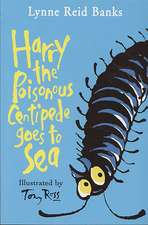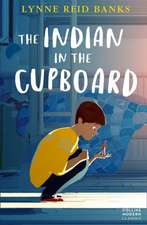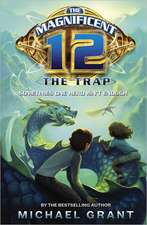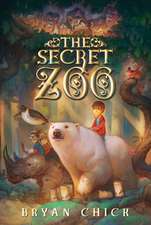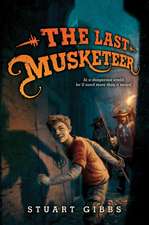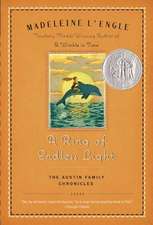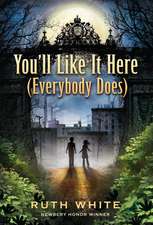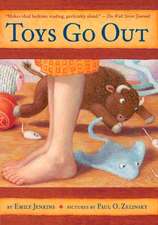Return of the Indian
Autor Lynne Reid Banksen Limba Engleză Paperback – 2 iun 2003
| Toate formatele și edițiile | Preț | Express |
|---|---|---|
| Paperback (2) | 44.42 lei 3-5 săpt. | +6.26 lei 6-12 zile |
| HarperCollins Publishers – 2 iun 2003 | 44.42 lei 3-5 săpt. | +6.26 lei 6-12 zile |
| Yearling Books – 31 ian 2010 | 48.84 lei 3-5 săpt. |
Preț: 44.42 lei
Nou
Puncte Express: 67
Preț estimativ în valută:
8.50€ • 8.86$ • 7.06£
8.50€ • 8.86$ • 7.06£
Carte disponibilă
Livrare economică 28 februarie-14 martie
Livrare express 13-19 februarie pentru 16.25 lei
Preluare comenzi: 021 569.72.76
Specificații
ISBN-13: 9780007148998
ISBN-10: 0007148992
Pagini: 192
Dimensiuni: 129 x 198 x 19 mm
Greutate: 0.15 kg
Ediția:New ed
Editura: HarperCollins Publishers
Locul publicării:United Kingdom
ISBN-10: 0007148992
Pagini: 192
Dimensiuni: 129 x 198 x 19 mm
Greutate: 0.15 kg
Ediția:New ed
Editura: HarperCollins Publishers
Locul publicării:United Kingdom
Notă biografică
Lynne Reid Banks is the bestselling author of many popular books for children and adults. She lives in England.
Extras
1
A Defeat
Omri emerged cautiously from the station into Hove Road.
Someone with a sense of humor and a black spray can had recently added an L to the word "Hove" on the street sign on the corner, making it "Hovel Road." Omri thought grimly that this was much more appropriate than "Hove," which sounded pleasantly like somewhere by the sea. Omri would have liked to live by the sea, or indeed almost anywhere in the world rather than Hovel Road. He had done his best to understand why his parents had decided to move here from the other house in the other, much nicer, neighborhood. True, the new house was larger, and so was the garden. But the area was a slum.
Omri's father objected strongly to Omri's calling it a slum. But then, he had a car. He didn't have to walk half a mile along Hovel Road to the station every day, as Omri did to get to school, and again--as now--to get home in the gloomy afternoon. It was October and the clocks had gone back. That meant that when he came out of the station it was practically dark.
Omri was only one of many children walking, playing or hanging around in Hovel Road at this hour, but he was the only one who wore school uniform. Of course he took his blazer and tie off in the train and stuffed them into his schoolbag, but that still left his white shirt, black trousers and gray pullover. However he mussed them up, he still stood out among the others he had to pass through.
These others all went to a local school where uniform was not required. Under other circumstances, Omri would have begged his parents to let him change schools. At least then he wouldn't have been an obvious outsider. Or maybe he would. He couldn't imagine going to school with these kids. After a term and a half of running the gauntlet of their mindless antagonism every working day, he regarded them as little better than a pack of wolves.
That group waiting for him on the corner by the amusement arcade. He knew them by now, and they knew him. They waited for him if they had nothing better to do. His passing seemed to be one of the highlights of their day. Their faces positively lit up asthey saw him approach. It took all his courage to keep walking towards them. At moments like this, he would remember Little Bear. Little Bear had been only a fraction of Omri's size, and yet he had stood up to him. If he had felt scared, as Omri did now, he never showed it. Omri was not that much smaller than these boys. There were just so many of them, and only one of him. But imagine if they'd been giants, as he was to Little Bear! They were nothing but kids like himself, although several years older. Except that they weren't like him. "They're rats," he thought, to rouse himself for battle. "Pigs. Toads. Mad dogs." It would be shameful to let them see he was afraid of them. He gripped his schoolbag tightly by both handles and came on.
If only he had had Boone's revolver, or Little Bear's knife, or his bow and arrows, or his ax. If only he could fight like a cowboy or an Indian brave! How he would show that crew then!
The boy he had to pass first was a skinhead, like several of the others. The cropped head made him look somehow animal-like. He had a flat, whitish face and about five gold rings in one ear. Omri should have detoured a bit to be out of range, but he would not swerve from his path. The skinhead's boot shot out, but Omri was expecting that and skipped over it. Then a concerted movement by the others jerked Omri into evasive action. Speed was his only hope. He broke into a run, hampered by his heavy bag.
Several hands reached out to grab him as he passed. One caught and held fast. He swung the bag and it hit home. The boy released his hold, doubled over and said, "Uuoogh!" It reminded Omri of the time Little Bear had fought Boone, the cowboy, and got kicked in the stomach--he'd made the same noise.
Someone else clutched Omri's flying shirttail and he jerked away hard and heard it rip. He swung around with his bag again, missed, found himself turning in a circle after the bag. There was the sound of jeering laughter. He felt hot rage flood under his skin. He was roused now, he wanted to stop, to fight; but he saw their sneering, idiot faces. That was all they were waiting for. They would beat him up--they'd done it once before and he had stumbled home with a bloody nose and a shoulder bruised from the pavement, and one shoe missing. His schoolbag, too. He'd had to go back (Adiel, the elder of his two brothers, had gone with him) and found all his books scattered and the bag torn and half full of garbage.
An experience like that taught you something. He fled, hating himself but hating his enemies worse. They didn't pursue him. That would have been too much trouble. But their shouts and jeers followed him all the way to his gate.
As he turned into it, he slowed down. He was on safe ground here. It was a different world. The property had a high hedge which shut it off from the street. The house was a nice house, Omri didn't deny that. He could see into the warm, well-lit living room, with its familiar furniture and lamps and ornaments and pictures.
His mother was in there, just putting a match to the open fire. Omri paused in the twilight to watch. He loved to see the flames. These, too, reminded him of Little Bear and the tiny fires he had made outside his tepee, the love dance he had done aroundhis fire when he had married Bright Stars . . . Omri sighed. It was over a year since that time. But not a single day had passed without his thinking about his Indian and all the astonishing adventures they had had together.
Omri had grown up quite a bit in the meantime. There had been moments when he would almost have liked to believe that he'd made the whole thing up. A plastic Indian coming alive--absurd! He had tried to push it to the back of his mind, but it wouldn't be pushed. It was as vividly real to him as if it had happened this morning.
The little bathroom cupboard. His special key, which his mother had given him. And magic. The magic that brought plastic people to life . . . It had happened, all of it . . . And yet, three days ago, Patrick had behaved in that peculiar way. It had shaken Omri, shaken his belief in his own memory.
A Defeat
Omri emerged cautiously from the station into Hove Road.
Someone with a sense of humor and a black spray can had recently added an L to the word "Hove" on the street sign on the corner, making it "Hovel Road." Omri thought grimly that this was much more appropriate than "Hove," which sounded pleasantly like somewhere by the sea. Omri would have liked to live by the sea, or indeed almost anywhere in the world rather than Hovel Road. He had done his best to understand why his parents had decided to move here from the other house in the other, much nicer, neighborhood. True, the new house was larger, and so was the garden. But the area was a slum.
Omri's father objected strongly to Omri's calling it a slum. But then, he had a car. He didn't have to walk half a mile along Hovel Road to the station every day, as Omri did to get to school, and again--as now--to get home in the gloomy afternoon. It was October and the clocks had gone back. That meant that when he came out of the station it was practically dark.
Omri was only one of many children walking, playing or hanging around in Hovel Road at this hour, but he was the only one who wore school uniform. Of course he took his blazer and tie off in the train and stuffed them into his schoolbag, but that still left his white shirt, black trousers and gray pullover. However he mussed them up, he still stood out among the others he had to pass through.
These others all went to a local school where uniform was not required. Under other circumstances, Omri would have begged his parents to let him change schools. At least then he wouldn't have been an obvious outsider. Or maybe he would. He couldn't imagine going to school with these kids. After a term and a half of running the gauntlet of their mindless antagonism every working day, he regarded them as little better than a pack of wolves.
That group waiting for him on the corner by the amusement arcade. He knew them by now, and they knew him. They waited for him if they had nothing better to do. His passing seemed to be one of the highlights of their day. Their faces positively lit up asthey saw him approach. It took all his courage to keep walking towards them. At moments like this, he would remember Little Bear. Little Bear had been only a fraction of Omri's size, and yet he had stood up to him. If he had felt scared, as Omri did now, he never showed it. Omri was not that much smaller than these boys. There were just so many of them, and only one of him. But imagine if they'd been giants, as he was to Little Bear! They were nothing but kids like himself, although several years older. Except that they weren't like him. "They're rats," he thought, to rouse himself for battle. "Pigs. Toads. Mad dogs." It would be shameful to let them see he was afraid of them. He gripped his schoolbag tightly by both handles and came on.
If only he had had Boone's revolver, or Little Bear's knife, or his bow and arrows, or his ax. If only he could fight like a cowboy or an Indian brave! How he would show that crew then!
The boy he had to pass first was a skinhead, like several of the others. The cropped head made him look somehow animal-like. He had a flat, whitish face and about five gold rings in one ear. Omri should have detoured a bit to be out of range, but he would not swerve from his path. The skinhead's boot shot out, but Omri was expecting that and skipped over it. Then a concerted movement by the others jerked Omri into evasive action. Speed was his only hope. He broke into a run, hampered by his heavy bag.
Several hands reached out to grab him as he passed. One caught and held fast. He swung the bag and it hit home. The boy released his hold, doubled over and said, "Uuoogh!" It reminded Omri of the time Little Bear had fought Boone, the cowboy, and got kicked in the stomach--he'd made the same noise.
Someone else clutched Omri's flying shirttail and he jerked away hard and heard it rip. He swung around with his bag again, missed, found himself turning in a circle after the bag. There was the sound of jeering laughter. He felt hot rage flood under his skin. He was roused now, he wanted to stop, to fight; but he saw their sneering, idiot faces. That was all they were waiting for. They would beat him up--they'd done it once before and he had stumbled home with a bloody nose and a shoulder bruised from the pavement, and one shoe missing. His schoolbag, too. He'd had to go back (Adiel, the elder of his two brothers, had gone with him) and found all his books scattered and the bag torn and half full of garbage.
An experience like that taught you something. He fled, hating himself but hating his enemies worse. They didn't pursue him. That would have been too much trouble. But their shouts and jeers followed him all the way to his gate.
As he turned into it, he slowed down. He was on safe ground here. It was a different world. The property had a high hedge which shut it off from the street. The house was a nice house, Omri didn't deny that. He could see into the warm, well-lit living room, with its familiar furniture and lamps and ornaments and pictures.
His mother was in there, just putting a match to the open fire. Omri paused in the twilight to watch. He loved to see the flames. These, too, reminded him of Little Bear and the tiny fires he had made outside his tepee, the love dance he had done aroundhis fire when he had married Bright Stars . . . Omri sighed. It was over a year since that time. But not a single day had passed without his thinking about his Indian and all the astonishing adventures they had had together.
Omri had grown up quite a bit in the meantime. There had been moments when he would almost have liked to believe that he'd made the whole thing up. A plastic Indian coming alive--absurd! He had tried to push it to the back of his mind, but it wouldn't be pushed. It was as vividly real to him as if it had happened this morning.
The little bathroom cupboard. His special key, which his mother had given him. And magic. The magic that brought plastic people to life . . . It had happened, all of it . . . And yet, three days ago, Patrick had behaved in that peculiar way. It had shaken Omri, shaken his belief in his own memory.

